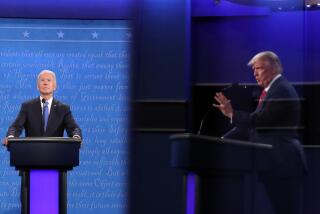Capitol Can’t Grasp Two Crises
- Share via
Watch as the world crisis roils on. Watch as more Asians fall through the middle class and plummet into poverty, exactly as an estimated 20 million did last year. Watch as the frailties of prominent financial institutions rattle the world’s nerves. Then watch as members of the U.S. Congress, playing for political advantage and goaded on by the strange dynamics of the media, do little about this unfolding crisis, but find all the time in the world for the gavel-to-gavel soap opera of an impeachment inquiry.
“This has got to be the worst time of my life,” confided a leading Clinton administration official, who hasn’t yet resigned. “Between the president’s lies and Congress’ hypocrisy, I can barely bring myself to get up out of bed and drive to work in the morning.”
But such is the life of the U.S. executive branch these days; by contrast, Congress is having a grand old time, especially the Grand Old Party. Be not moved by solemn protestations about “historic duty” and “a grave burden”; for the Hill, this impeachment tornado is the most fun since the O.J. gavel-to-rabble.
And it was a whole lot more fun than anyone was having last week at a conference of the International Monetary Fund in a Washington hotel just blocks away from Capitol Hill. Finance officials from dozens of nations (including all the major industrialized ones) were ruminating about the fate of this good economic Earth. Among the head-scratchers: the bosses of the International Monetary Fund, the World Bank and other institutions that would like to be the crisis’ gallant institutional knights come to save the day but who could well go down in history as the enemy within. William McDonough, president of the N.Y. Federal Reserve Bank, termed the moment “the most serious financial crisis since World War II.” World Bank President James Wolfensohn agreed: “We meet under the shadow of a global crisis. We must embrace the human pain. It seems inappropriate to talk of housekeeping when the village is burning. The poor cannot wait until we wake up--too late--to the fact that the human crisis affects us all.”
Alas, the Germans were unmoved by pressure from Washington to lower their Bundesbank’s interest rates to aid in the counterattack on creeping deflation that could suck the life out of whole national economies. Such a move by Bonn might help as much as banking reform out of the oft-bashed Tokyo. At least President Clinton, unlike most of the news media or Congress, showed up for the conference. As with almost all foreign policy issues, Clinton comes to the crisis competently but belatedly and now gravely politically wounded.
If the enervating and nightmarish burden of having to defend himself from impeachment causes Clinton to lose focus on what is now his most important job--defending his country against recession, then, yes, he must resign. But let that same strict performance standard be applied to others as well. If, for instance, Alan Greenspan cannot persuade his Federal Reserve Board colleagues to reach consensus on pushing down rates to the point that world demand reignites, he, too, should resign, if only to get everyone’s attention. Hasn’t Michel Camdessus botched his job as head of the International Monetary Fund? He should resign, if only as a matter of honor. What if history determines that Congress’ obsession with Kenneth Starr’s obsession with Clinton’s sex, lies and videotape was a major factor behind world recession? Then the wrong branch of government will have been in the impeachment spotlight: Congress should impeach itself.
An increasingly worried world is watching, not least in California, where people are steeling for the coming economic downshift despite the current strength of job growth and employment. At a packed L.A. conference of the Asian Business League of Southern California last week, the anxiety reached every member of the group--many of them Asian American, bilingual and expert in such specialties as cross-currency asset management, joint venture structuring and loan-asset management. Like any cosmopolitan group, they reflect a wide range of views about whether Clinton should be impeached. But were its 600 plus members to be convinced that the U.S. political and media systems have the capacity for all-out, full-time concentration on but one crisis at a time, the economy would have won hands-down over impeachment in that ballroom.
The final tab for Congress’ impeachment preoccupation could be world recession or worse if America cannot simultaneously process both crises. It’s hard to see how it can. So, exactly like Japan, which it often criticizes, and more and more like Germany, which it rarely criticizes, the United States, often termed “the essential nation,” instead becomes the handicapped nation, unable to get its act together precisely when its full strength is most needed.
More to Read
Sign up for Essential California
The most important California stories and recommendations in your inbox every morning.
You may occasionally receive promotional content from the Los Angeles Times.













